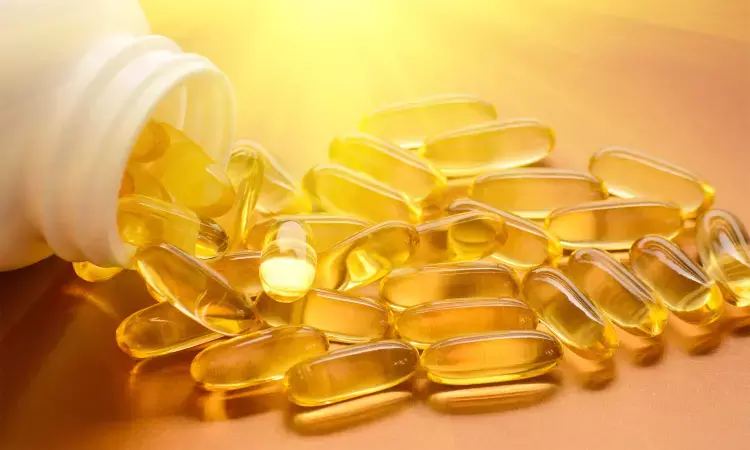- Home
- Medical news & Guidelines
- Anesthesiology
- Cardiology and CTVS
- Critical Care
- Dentistry
- Dermatology
- Diabetes and Endocrinology
- ENT
- Gastroenterology
- Medicine
- Nephrology
- Neurology
- Obstretics-Gynaecology
- Oncology
- Ophthalmology
- Orthopaedics
- Pediatrics-Neonatology
- Psychiatry
- Pulmonology
- Radiology
- Surgery
- Urology
- Laboratory Medicine
- Diet
- Nursing
- Paramedical
- Physiotherapy
- Health news
- Fact Check
- Bone Health Fact Check
- Brain Health Fact Check
- Cancer Related Fact Check
- Child Care Fact Check
- Dental and oral health fact check
- Diabetes and metabolic health fact check
- Diet and Nutrition Fact Check
- Eye and ENT Care Fact Check
- Fitness fact check
- Gut health fact check
- Heart health fact check
- Kidney health fact check
- Medical education fact check
- Men's health fact check
- Respiratory fact check
- Skin and hair care fact check
- Vaccine and Immunization fact check
- Women's health fact check
- AYUSH
- State News
- Andaman and Nicobar Islands
- Andhra Pradesh
- Arunachal Pradesh
- Assam
- Bihar
- Chandigarh
- Chattisgarh
- Dadra and Nagar Haveli
- Daman and Diu
- Delhi
- Goa
- Gujarat
- Haryana
- Himachal Pradesh
- Jammu & Kashmir
- Jharkhand
- Karnataka
- Kerala
- Ladakh
- Lakshadweep
- Madhya Pradesh
- Maharashtra
- Manipur
- Meghalaya
- Mizoram
- Nagaland
- Odisha
- Puducherry
- Punjab
- Rajasthan
- Sikkim
- Tamil Nadu
- Telangana
- Tripura
- Uttar Pradesh
- Uttrakhand
- West Bengal
- Medical Education
- Industry
Vitamin D does not prevent postoperative Crohn's Disease after ileocolonic resection

Netherlands: Patients with Crohn's disease (CD) are generally known to be deficient in vitamin D and high-dose vitamin D is known to have anti-inflammatory effects in CD patients. However, according to a recent study administration of high-dose vitamin D did not prevent the postoperative occurrence of Crohn's disease after ileocolonic resection. The study is published in the journal Clinical Gastroenterology and Hepatology.
Jessica R. de Bruyn, University of Amsterdam, Amsterdam, the Netherlands, and colleagues conducted the study to determine whether high-dose vitamin D prevents postoperative recurrence of CD after ileocolonic resection.
For this study, CD patients undergoing ileocolonic resection were given weekly 25,000 IU oral vitamin D (n=72) or placebo (n=71) postoperatively. Patients were assessed at baseline and week 2, 6, 12, and 26 for laboratory and clinical parameters, and underwent ileocolonoscopy at 26 weeks. The primary endpoint was endoscopic recurrence on ileocolonoscopy at 26 weeks.
Key findings of the study include:
- In the vitamin D group, serum levels of 25-hydroxy vitamin D increased from median 42 nmol/L at baseline to 81 nmol/L at week 26, whereas levels did not change significantly in the placebo group and remained unchanged at 43 nmol/L.
- In the intention-to-treat analysis, the proportion of patients with endoscopic recurrence at 26 weeks did not differ significantly between the vitamin D vs the placebo group (58% vs 66%).
- The cumulative rate of clinical recurrence did not differ significantly between the groups (18.1% in the vitamin D group vs 18.3% in the placebo group).
- Quality of life improved slightly over time in both groups but did not differ significantly between groups.
- There were few adverse events in either group.
Compared with placebo, high dose vitamin D did not reduce the incidence of postoperative endoscopic or clinical recurrence of CD in patients who underwent ileocolonic resection with ileocolonic anastomosis.
The study, "High-Dose Vitamin D Does Not Prevent Postoperative Recurrence of Crohn's Disease," is published in the journal Clinical Gastroenterology and Hepatology.
Dr Kamal Kant Kohli-MBBS, DTCD- a chest specialist with more than 30 years of practice and a flair for writing clinical articles, Dr Kamal Kant Kohli joined Medical Dialogues as a Chief Editor of Medical News. Besides writing articles, as an editor, he proofreads and verifies all the medical content published on Medical Dialogues including those coming from journals, studies,medical conferences,guidelines etc. Email: drkohli@medicaldialogues.in. Contact no. 011-43720751


